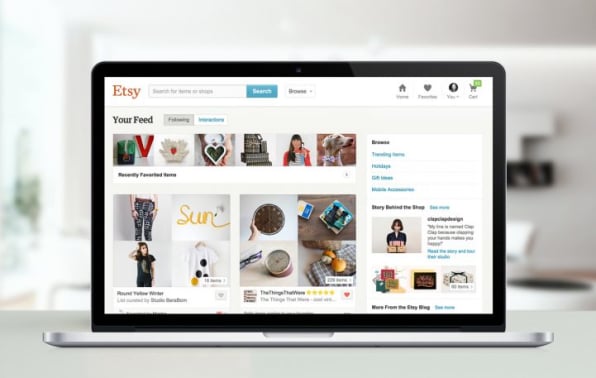Will Etsy Keep Its Commitment To Social Good After Its Management Shakeup?
By Adele Peters , May 04, 2017
When Etsy went public in 2015, it faced a choice: would it stay meaningfully committed to its mission for social good and create a new platform for a more inclusive form of commerce? But after its IPO, the company largely continued on the same path, building an ultra-sustainable Brooklyn office, maintaining an ideologically driven work culture that was unusual in the tech world, and choosing to get recertified as a B Corp (a designation that requires meeting high standards of social and environmental performance and transparency).
Etsy now faces a similar choice. The company lost $ 421,000 in the first quarter of 2017, and on May 2 Chad Dickerson, who had served as CEO since 2011 (and as CTO before that) was ousted–along with the current CTO. The company also says it plans to cut 8% of the workforce. With investors and new leadership given a clear mandate to focus on profit, will Etsy lose its commitment to social responsibility?
The company’s stated (and as of yet unchanged) mission is to “reimagine commerce in ways that build a more fulfilling and lasting world.” Since its founding, the company saw itself as a more personal and friendly e-commerce alternative to corporate behemoths like eBay and Amazon. An early marketing poster featured a kid throwing a Molotov cocktail at a factory.

Etsy’s Brooklyn office runs on local solar power, has bike parking, and uses rainwater collected from the roof for office plants. It has tested giving its sellers discounts on solar panels on their own homes. It helps people make money from fulfilling, creative work; nearly a third of sellers are from low-income communities, and a majority are women. The company invested heavily in sophisticated technology to help sellers compete with other online marketplaces, including tools for promotion, sourcing materials, managing inventory and shipping, and machine translation to assist entrepreneurs with international sales. (In rare cases, sellers can make nearly $ 1 million a year selling handmade leg warmers and scarves.)
When the B Lab crunched the numbers to certify Etsy as a B Corp in 2016–studying a combination of the company’s policies for workers, the environment, customers, and the community–Etsy scored 127, more than twice the median for other companies.
In the tech world, it was known for a unique, “blameless” culture that supported workers in learning from mistakes, and an anti-corporate attitude. Some employees felt that going public was a mistake, as one former employee wrote in a thread on HackerNews on May 3. “Etsy was trying to be a company that put ‘people above profits,’ which is extremely difficult to do as a public company,” they wrote. “Market backlash against that kind of sentiment is severe.” Others argue that Etsy lost its indie soul long ago.
Dickerson addressed those difficulties in 2016, writing:
When Etsy went public last year, there was a lot of discussion about whether we could be both a public company and a socially responsible business. As I wrote at the time, “we reject the premise that there is a choice to make between the two. Etsy’s strength as a business and community comes from its uniqueness in the world and we intend to preserve it.” This remains true today. We’re in an era of great innovation when it comes to social responsibility and business, and we believe that all companies, no matter their size or what type of corporate structure they employ, can and should use the power of business to create social good.
But a former employee told Fast Company that the recent change truly felt like the end of an era–a particularly symbolic one because the new CEO previously held executive roles at eBay, often held up inside Etsy as an example of the type of company it didn’t want to be. When the news of the change in leadership came, employees and former employees rushed to praise the departing team.
It remains to be seen whether new CEO Josh Silverman, who was also CEO at Skype and Evite, will share that same commitment to the company’s non-financial values (Etsy declined an interview at this time, Dickerson is staying on as an adviser until the end of the month). But there are some reasons to believe that the company may continue on its socially responsible path, at least in part.

“The incoming CEO for Etsy is a board member [of Etsy], and as a board member, ought to be pretty aware of Etsy’s prior leadership as a B Corp and how important the certification has been internally, particularly to their team members,” says Jay Coen Gilbert, co-founder of B Lab. “When you’re in an industry as competitive for talent as Etsy is in the tech space, having folks be able to bring their whole selves to work every day, and do something they think is meaningful–not just lucrative–can be pretty important for attracting and retaining talent.” The company’s customers and network of sellers expect something similar.
In major transitions in the past, some other socially-responsible businesses have managed to hold onto their values. Seventh Generation, known for selling plant-based soap and laundry detergent, faced similar questions when long-time CEO Jeffrey Hollender was fired by the company’s board.
“There was lots of concern both internally and externally, from employees and customers, as to whether Seventh Generation was going to stay aligned on mission,” says Gilbert. But under a new CEO, the company “increased its impact dramatically. I think that’s a pretty good example of a company of a decent scale and a significant amount of brand equity tied up in their sustainability story that was at risk in the transition.”
While the B Corp certification is voluntary–companies go through the detailed certification process every two years but can choose to stop–Etsy also has deeper involvement. The company worked with B Lab and Delaware legislators to create a new corporate structure called a “benefit corporation” that makes it possible for companies to focus on public benefit, not just shareholder value. B Corp certification requires that companies meet a certain legal standard; in Etsy’s case, as a corporation based in Delaware, it will have to become a benefit corporation by August 2017 if it wants to retain its certification.
“The new leadership has that in front of it as sort of a first test, if you will, about whether they’re serious about being the same type of company going forward as they have been in past,” says Gilbert.
(31)



